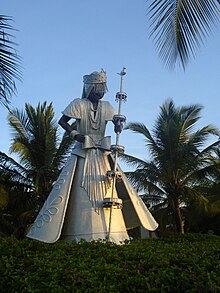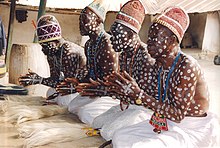Ọbatala
This article has multiple issues. Please help or discuss these issues on the talk page. (Learn how and when to remove these template messages)
|
| Ọbatala | |
|---|---|
Creation (especially humans) and the sky | |
| Member of Orisha | |
 Statue of Obatala in Costa do Sauípe, Bahía | |
| Other names | Obatala or Obatalá; (obataasha)Ochala or Oxalá; and Orichalá or Orixalá |
| Venerated in | Yoruba religion |
| Color | White |
| Region | Yorubaland, Latin America |
| Ethnic group | Yoruba |
| Personal information | |
| Spouse | Yemowo (Ile-Ife, modern-day Nigeria); Yemaya (Americas) |
Obatala or “Orisa Nla” (known as Obatalá in Yorubaland and in Caribbean and South American Spanish and Oxalá in Brazil) is an orisha. He is believed, according to Yoruba cosmology, to be the Sky Father and the creator of human bodies, which were brought to life by the smooth breath of Olodumare. Obatala is the oldest of all orishas (imole). His principal wife is Yemaya according to understanding in Caribbean. However, in Yorubaland, particularly Ile-Ife, where he is believed to have lived, it is understood that he had 201 wives with his favourite consort being Yemowo.[1]
Obatala was authorized by Olodumare to create land upon the water beneath the sky. Due to his efforts, the first Yoruba city, Ife, was founded. Obatala is Olodumare's representative on Earth and the shaper of human beings.[2]
According to the oral traditions of Ife, the mortal Obatala was the founder of and the king of Ife during its classical period. His position as the King was challenged by Oduduwa who assumed leadership of the town for a brief moment. However, Obatala was able to emerge victorious in the contest and it led to the murder of his rival Oduduwa and the retrieval of his throne.[3]
While there exists an Obatala in the Yoruba pantheon. The understanding of the qualities of the Obatala god was merged into the human Obatala that ruled in Ife upon his posthumous deification. Thus, the human Obatala who was the king at Ife was admitted to the Yoruba pantheon as an aspect of the primordial divinity of the same name.
In Africa[]
Primordial Obatala[]

According to the tenets of the Yoruba religion, Obatala is one of the oldest of all of the orishas and was granted authority to create the Earth. A tradition states that before he could return to heaven and report to Olodumare, Oduduwa usurped his responsibility (due to Obatala's being drunk at the time). He took the satchel that Olodumare had given Obatala to aid him in creation and used it to create land on the primeval ocean. A great feud ensued between the two siblings. However, an assessment of Yoruba traditional religion shows that each of the 201 deity are understood by their descendants and adherents to have carried out the creation of the earth. [4] This suggests beginning of the world is an aspect of Yoruba cosmogenesis associated with numerous deities in Yoruba pantheons beyond Obatala or Oduduwa.
Mortal Obatala[]
Oba Obatala was the founder and the King of Ile-Ife, hence the appellation, Olufe. His reign was disrupted by an usurpation led by Oduduwa and his supporters such as Obameri, Obadio, Aloran, Ejio and Apata. However, Obatala was able to facilitate the death of Oduduwa and retrieve his throne as the king of Le-Ife with the assistance of his support base consisting of Oluorogbo, Orunmila, Akire, Obalufon Ogbogboinrin (Obamakin), Owa Ilare and numerous others. This is re-enacted every year in the Obatala festival in Ife and the coronation rites of Ooni which indicate Obatala’s ownership of the crown, throne and authority.[5] Ultimately, following the war between Obatala on the one hand and Oduduwa on the other, the latter lost and his support based dispersed. Thus, leading to a rotated rulership between the lineages of Obatala and Obalufon Ogbogbodinrin (Obamakin) who succeeded him. This was in effect till a coup conducted by Lajamisan, a descendant of Oranfe, disrupted the ruling structure.[6]
In the Americas[]
Santería[]

| Part of a series on |
| Yoruba people |
|---|
 |
| Subgroups |
| Religion |
Social / Communal concepts:
|
| Politics/History |
|
Timeline : History of the Yoruba people Titles (Oyè): Olorì · Òjoyè · Baálẹ̀ · Ọmọba · Ọlọ́jà · Ìyálóde · Olú-awo · Olótu · Baṣọ̀run |
| Diaspora |
|
| Festivals and events |
|
West Africa:
Diaspora:
|
| Geography |
| Yorubaland |
| Notable personalities |
| List of Yoruba people |
| Performing Arts |
|
Contemporary: Folk/Traditional: |
Obatalá (also known as Ochalá or Oxalá; Orichalá or Orixalá) is the oldest "orisha funfun" ("white deity"), referring to purity, both physically and symbolically as in the "light" of consciousness. In Santería, Obatalá is syncretized with Our Lady of Mercy and Jesus Of Nazareth. Obatalá is said to have an equal number of male paths as female paths, but more often crowns women in part because men are traditionally crowned in Ifá in many lineages.
Candomblé[]
In Candomblé, Oxalá (Obatalá) has been syncretized with Our Lord of Bonfim; in that role, he is the patron saint of Bahia. The extensive use of white clothing, which is associated with the worship of Oxalá, has become a symbol of Candomblé in general.[7] Friday is the day dedicated to the worship of Oxalá. A large syncretic religious celebration of the Festa do Bonfim in January in Salvador celebrates both Oxalá and Our Lord of Bonfim; it includes the washing of the church steps with a special water, made with flowers.
Snails[]
The snail Achatina fulica is used for religious purposes in Brazil as an offering to Obatala. It is seen as a substitute for the African giant snail (Archachatina marginata) that is used in Yorubaland because they are known by the same name (Igbin, also known as Ibi) in both Brazil and Yorubaland.
Offerings and Rituals[]
Offerings[]
Animal offerings for Obatala usually consist of white hen, snake, pigeon, goat, slugs, snails, or guinea. Offerings that include alcohol, crab, or beans are not allowed. The color white is very important in the representation of Obatala, therefor food offerings consist of white rice, milk, cream, shredded coconuts, and white bread. Offerings should be bland and not consist of any spices. White clothing should be worn when celebrating Obatala and offerings should be made on clean white cloth.
Iconography[]
Obatala is pictured wearing sparkling white clothes, a white crown, and a staff called an . This staff is generally made of wood from the atori vine. Another symbol of Obatala is the dove.
Oriki (praise names)[]
- Oluwa Aye - Lord of the Earth
- Alabalashe - He who has divine authority
- Baba Arugbo - Old Master or Father
- Baba Araye - Master or Father of all human beings
- Orishanla (also spelled Orishainla or Oshanla) - the arch divinity
- Olufe - King of Ife or Lord of Ife
- Oseremagbo - King of Ugbo
See also[]
Bibliography[]
- Idowu, E. Bolaji: Olodumare: God in Yoruba Belief, London 1962.
- Elebuibon, Yemi: Adventures of Obatala, Pt. 2.
- Lange, Dierk: "The dying and the rising God in the New Year Festival of Ife", in: Lange, Ancient Kingdoms of West Africa, Dettelbach 2004, pp. 343–376.
References[]
- ^ The Cradle of a Race: Ife from the Beginning to 1980 by Isaac Adeagbo Akinjogbin
- ^ Tales of Yoruba Gods & Heroes by Harold Courlander
- ^ Ancient Ile-Ife: Another Cultural Historical Reinterpretation by Ade Obayemi
- ^ “Iwori Meji” in The Original Major Odu Ifa Ile Ife Volume 1 by Ologundudu, A., and Aworeni, A
- ^ NAI CSO 26/3 file 29829, Report on the Native Organisation of Ife District – Oyo Province by J. A. McKenzie
- ^ Voice of Africa by Leo Frobenius
- ^ van de Port, Mattijs (2015). "Bahian white: the dispersion of Candomblé imagery in the public sphere of Bahia". Material Religion. 3 (2): 242–274. doi:10.2752/175183407X219769. ISSN 1743-2200.
- Yoruba gods
- Creator gods
- Sky and weather gods